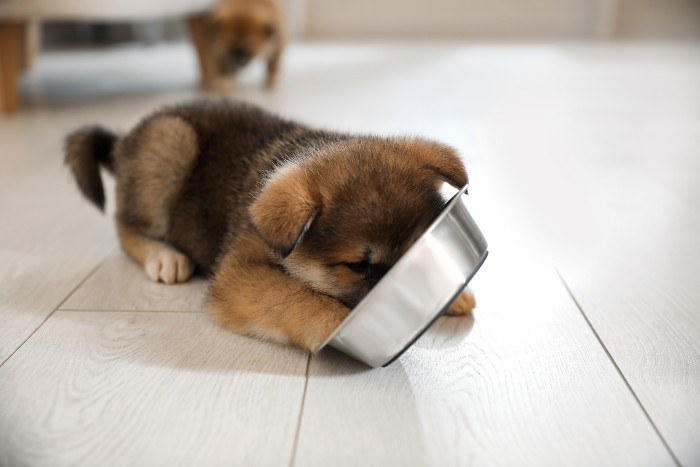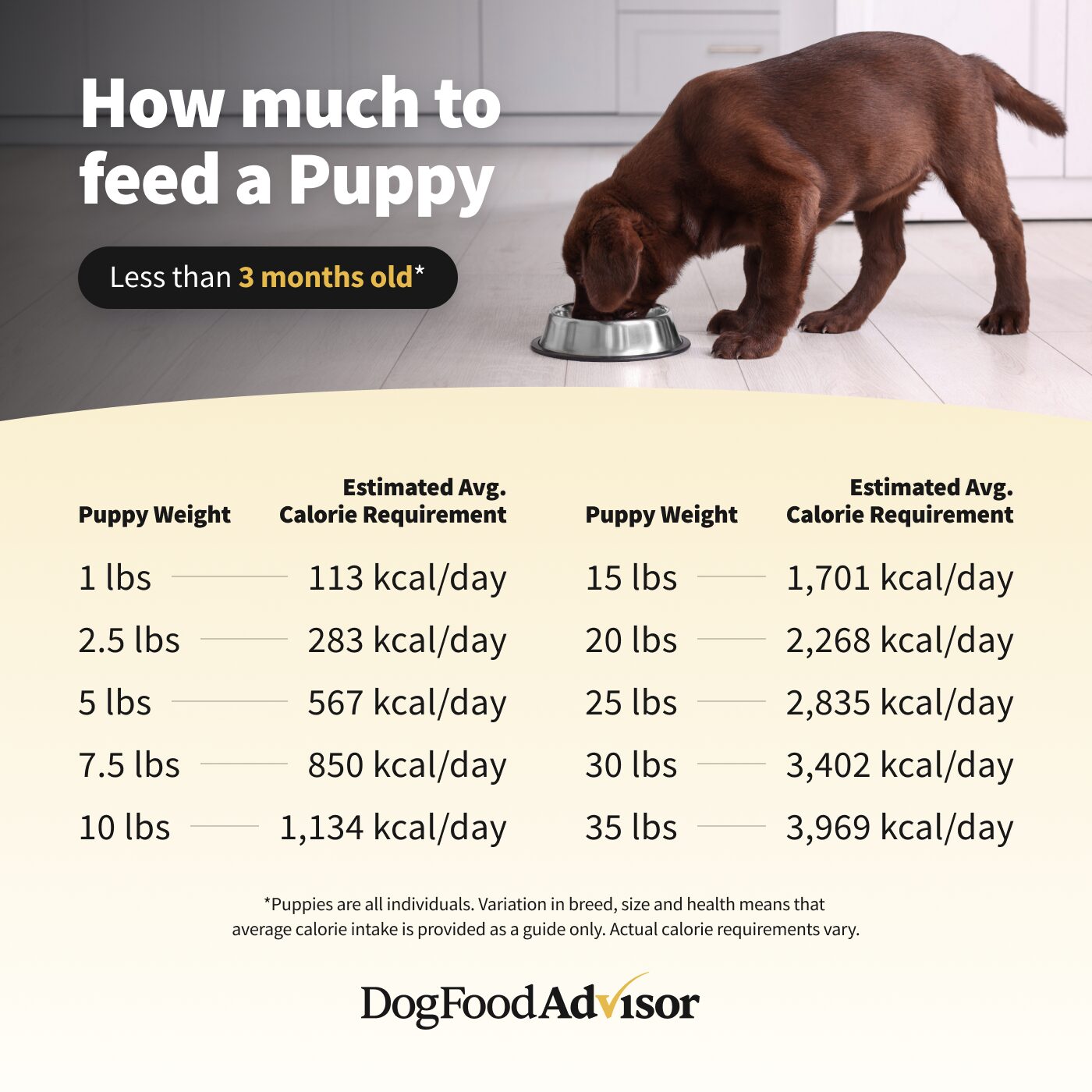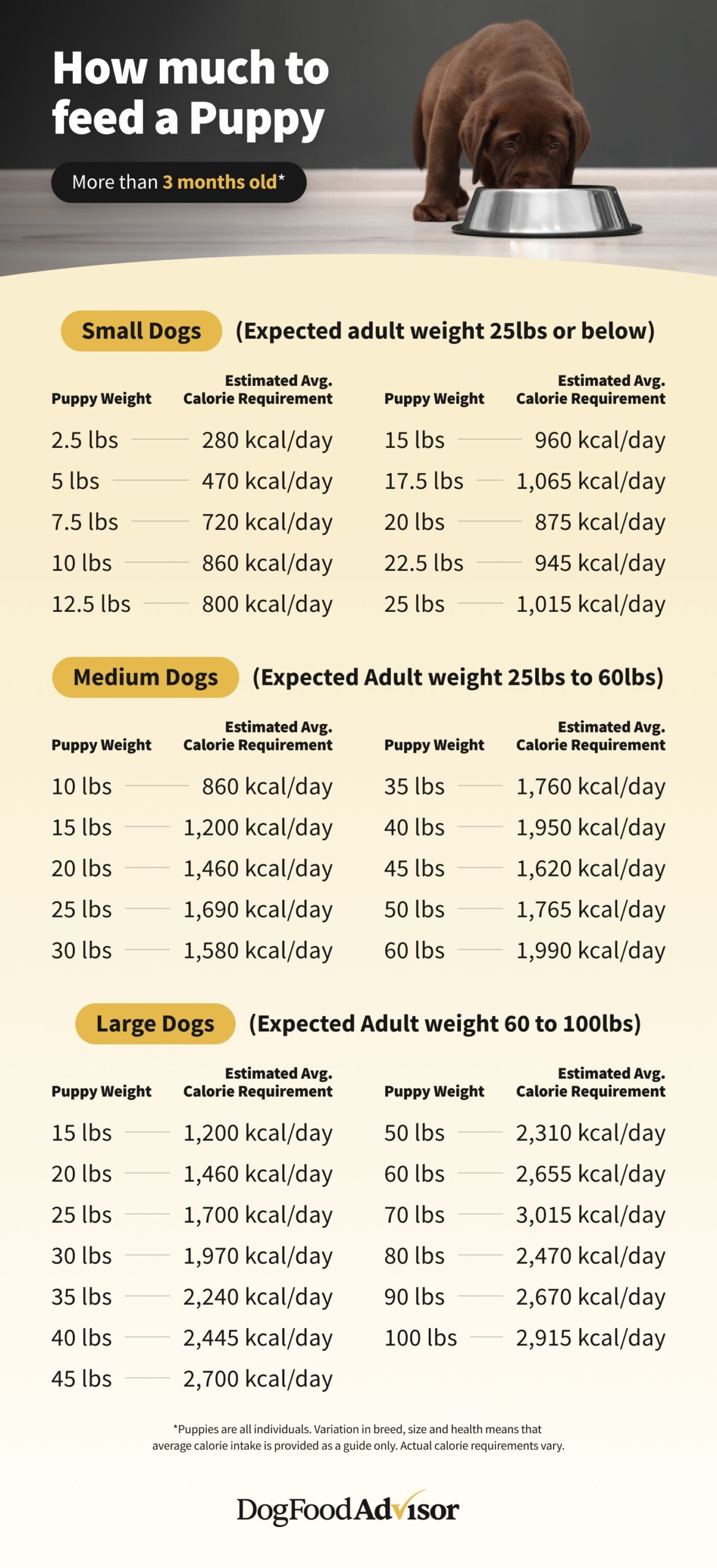
DogFoodAdvisor is reader supported See how
Dog Food Advisor is 100% impartial and is never paid to promote any brand. But if you buy using links on this page, we may earn a referral fee.
Welcoming a new puppy to the family is an exciting time, but figuring out how to feed a puppy can be tricky for new pet parents.
After the initial excitement, you may find your head spinning with questions like: How much should I feed my puppy? What’s the best puppy food? When and how often should I feed my puppy? What foods should I avoid?
Whether this is your first dog or it’s just been a while since you’ve had one so small and helpless, it can be stressful getting everything organized. Plus, you’ve probably heard many different things about how to take care of your new arrival.
But, don’t panic! We’re here to make life a little easier (well as easy as it can be with a hyper, new pup) with a guide on everything you need to know about feeding your puppy.
How much to feed a puppy
There are a lot of variables when it comes to feeding your puppy. A Bernese Mountain puppy for example is going to differ from a Chihuahua.
There are three key things to take into consideration when feeding your puppy:
- Age
- Breed
- Size/weight
It’s essential to feed your puppy the right amount of wholesome food from an early age. It protects them from developing common health problems later in life by being overweight or eating the wrong ingredients.
Puppy Feeding Chart (less than 3 months old)

How often to feed a puppy
Before your puppy arrives at their new home, they will have gone through the weaning stages and most likely have been fed around four to six times a day.
You will be bringing the puppy home between two to three months and it’s advised to keep them eating four meals a day until they develop a little more. They will also be nervous in their new home so it’s good to keep things as normal as possible for them.
Puppies require multiple small meals because when they are small, they struggle to regulate their blood sugar. So, food little and often stabilises their blood sugar which means they can eat enough to supply their huge nutritional requirements for all the growth and development that is happening during this time.
As your puppy progresses to around four to six months, bring their meals down to two to three a day. Finally, when they’ve hit their half-year birthday (six months), throw a little party because it’s now time to feed them just like an adult – usually twice a day.
What is the ideal diet for a puppy?
A puppy’s food must be easily digestible and nutrient-dense, to supply all of the nutrients they need for this phase of growth and development, through only a small portion.
High-quality ingredients help nutrients to be available to the puppy during digestion.
If you are buying commercially made food, it’s important to get a life-stage food that clearly states that it’s made for puppies. Also, look out for these words on the label [1. https://www.webmd.com/pets/dogs/feeding-puppy]
- “Complete and balanced nutrition”
- “Meets the nutritional requirements of puppies established by the Association of American Feed Control Officials (AAFCO)”
- “Complete and balanced nutrition for puppies based on AAFCO feeding trials”
- “Complete and balanced nutrition for growth”
- “All life stages”
If you still feel overwhelmed, take a look at our list of top puppy foods for inspiration. Additionally, if you are making home dog food, seek advice from a vet or nutritionist to ensure your puppy is getting the essential nutrients and correct portions.
What nutritional requirements do puppies need?
Specially formulated puppy foods are ideal as they contain the essential nutrients for a puppy to thrive.
Opting for puppy food is important because:
- Puppy food is more nutrient-dense to supply what they need in a small portion.
- It must be highly digestible to make the nutrition within the food accessible to the puppy.
- It comes in smaller pieces.
- The protein and fat are higher, because of all the development and growth happening
- Calcium, and calcium to phosphorus ratio is lower in puppy foods, to ensure the strong growth of the bones and skeleton. Providing too much calcium can cause bones to grow too quickly, be weak, and with abnormalities. Do not add calcium supplements to puppy foods[2. https://www.petmd.com/dog/nutrition/when-should-you-switch-puppy-adult-dog-food], however.
Puppy Feeding Chart (more than 3 months old)

When should you switch puppies to adult dog food?
It’s critical not to switch your puppy to adult food too soon. The best time to switch your puppy to adult food depends on your puppy’s breed type:
- Small-breed dogs that weigh 20 pounds or less when fully grown are usually ready to eat adult food at 9 to 12 months of age.
- Medium-breed dogs that weigh between 20 and 50 pounds as adults normally mature at 12 to 14 months of age.
- Large- and giant-breed dogs that weigh more than 50 pounds when fully grown might not be ready to switch to adult food until they’re 12 to 24 months old.[3. https://www.iams.com/dog/dog-articles/your-puppy-ready-adult-dog-food]
When transitioning, ensure to do so gradually by mixing puppy food in until their tummies get used to the new food.
Can my puppy eat treats?
Around the age of eight weeks, you can start giving your puppy a treat or two (remember no more than 10% of their daily calories). It’s best to introduce one with simple ingredients to begin with as any new dietary addition can be overwhelming for puppies, especially those with sensitive stomachs.
It’s best to pick up some treats that are specific to puppies and have high-quality ingredients. It can be good to get your pup used to treats with healthy ingredients from the onset.
Do puppies need supplements?
There’s normally no need for extra supplements or pieces of human food – they should receive everything they need in their dog food. Do not give additional calcium or vitamin and mineral supplements with a balanced diet, as these unbalance the diet and can lead to health issues.
However, if you are giving your puppy homemade dog food or think they require extra supplementation, speak to your vet first as it can be harmful to give them extra vitamins.
What foods should you not give a puppy?
It is advised only to feed your puppy suitable food and treats but there are especially some foods to stay clear of.
Here are some things you should never feed a puppy:
- Raw meat (Unless, in the case of raw feed puppies, it should still be a complete and balanced food.)
- Chocolate
- Garlic
- Onions
- Grapes/raisins
- Avocados
- Sugary foods and drinks
- Caffeine
- Alcohol
- Macadamia nuts
- Bones
There can be a lot to think about when getting a new puppy so it’s important to do your research and make sure you are ready to welcome a bundle of energy into your home.
Young dogs need to intake essential nutrients so they can live a long and happy life with you.
Best Puppy Foods
There are plenty of great foods out there for puppies. You can take a look at our pick of the Best Puppy Foods here:
Final word
The Dog Food Advisor does not accept money, gifts, samples or other incentives in exchange for special consideration in preparing our reviews.
However, we do receive a referral fee from online retailers (like Chewy or Amazon) and from sellers of perishable pet food when readers click over to their websites from ours. This helps cover the cost of operation of our free blog. Thanks for your support.
For more information, please visit our Disclaimer and Disclosure page.
Article reviewed by
Laura Ward
Pet Nutritionist
Laura studied BSc (Hons) Animal Science with an accreditation in Nutrition at the University of Nottingham, before working for eight years in the pet food and nutrition industry.




